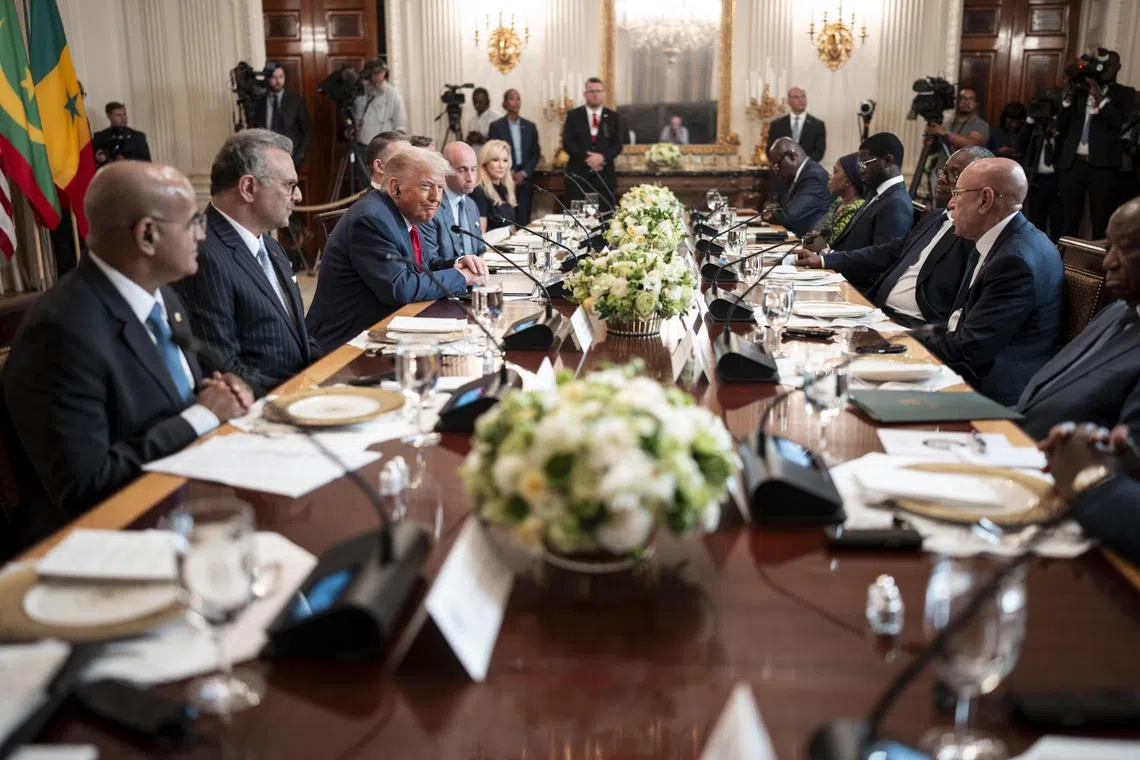Trump eyes African mineral wealth in trade-focused summit
Sign up now: Get ST's newsletters delivered to your inbox

US President Donald Trump (third from left) speaking at his lunch with African leaders at the White House on July 9.
PHOTO: NYTIMES
- Trump hosted West African leaders, seeking stronger trade ties to counter Russian and Chinese influence, focusing on the region's rich resources.
- The US is shifting from aid to trade-based partnerships, despite potential negative impacts like increased deaths in West Africa by 2030.
- Security concerns, including drug trafficking, immigration and political instability, also featured in the discussions during the White House summit.
AI generated
WASHINGTON - US President Donald Trump hailed West Africa’s rich natural resources as he hosted five of its leaders on July 9 for a White House summit aimed at fostering trade to counter the growing influence of Russia and China.
Mr Trump’s administration is seeking to strengthen economic ties with the mineral-rich region as it simultaneously curbs foreign aid to Africa and hits nations with 10 per cent import tariffs.
Talks with the presidents of Senegal, Liberia, Guinea-Bissau, Mauritania and Gabon were expected to focus on commercial opportunities and security.
“We’re working tirelessly to forge new economic opportunities involving both the United States and many African nations,” Mr Trump told the assembled leaders and reporters ahead of the meeting.
“There’s great economic potential in Africa, like few other places, in many ways.”
He gushed about the continent’s “vibrant places, very valuable lands, great minerals, great oil deposits” – and was rewarded with personal praise in return as each leader offered their approval when asked by an African media outlet if Mr Trump should win a Nobel Peace Prize.
The talks – held over a lunch in the State Dining Room – came with Washington seeking to ensure a stable supply of critical minerals.
All five of the countries invited enjoy rich natural resources, including manganese – a key mineral in the production of stainless steel and batteries – iron ore, gold, diamonds, lithium and cobalt.
But overshadowing the talks will be radical steps by Trump and his officials to recalibrate US relations with African nations.
Earlier this month, the administration shuttered the US Agency for International Development (USAID), and said it was moving away from a “charity based-model” to focus instead on trade-based partnerships.
West Africa is expected to be among the regions hardest hit by the aid cuts, which are likely to lead to more than 14 million additional deaths globally by 2030, according to a study published in the Lancet medical journal.
Drug trafficking and immigration
US financial help played a crucial role in rebuilding Liberia after its civil wars, and it was still receiving an annual US$160 million (S$200 million) – about 3 per cent of its GDP – as recently as 2024.
“Liberia is a long time friend of the United States, and we believe in your policy of making America great again,” President Joseph Boakai told Mr Trump.
“And we also go a long way with you and your in your diplomacy that has to do with economic development and commercial friendship.”
US arch-rival China has made substantial investments in several of the nations attending, with Gabon providing 22 per cent of the manganese it uses in batteries.
Russia has, meanwhile, supported the nascent Alliance of Sahel States, which shares borders with several of the countries at the July 9 lunch.
Security is expected to loom large at the meeting, with international drug trafficking and immigration top concerns for Washington.
West Africa’s Sahel countries have been dogged by attacks from terrorist groups, while a series of coups have deepened political instability.
Entries from the region make up a significant portion of the Black immigrant population in the United States, which rose by almost a quarter between 2012 and 2022, reaching 4.3 million individuals.
Guinea-Bissau – a transit zone for cocaine shipments from Latin America to Europe and beyond – has struggled to contain drug trafficking.
“Guinea-Bissau is a peaceful country, and we are a small country. But we are a great state – not a great state like the United States, but we’re a great country as well,” said the country’s President Umaro Sissoco Embalo.
A potential US travel ban impacting Gabon, Liberia, Mauritania, and Senegal was reported in June, as part of a larger list of 36 countries facing scrutiny by the Trump administration. AFP


